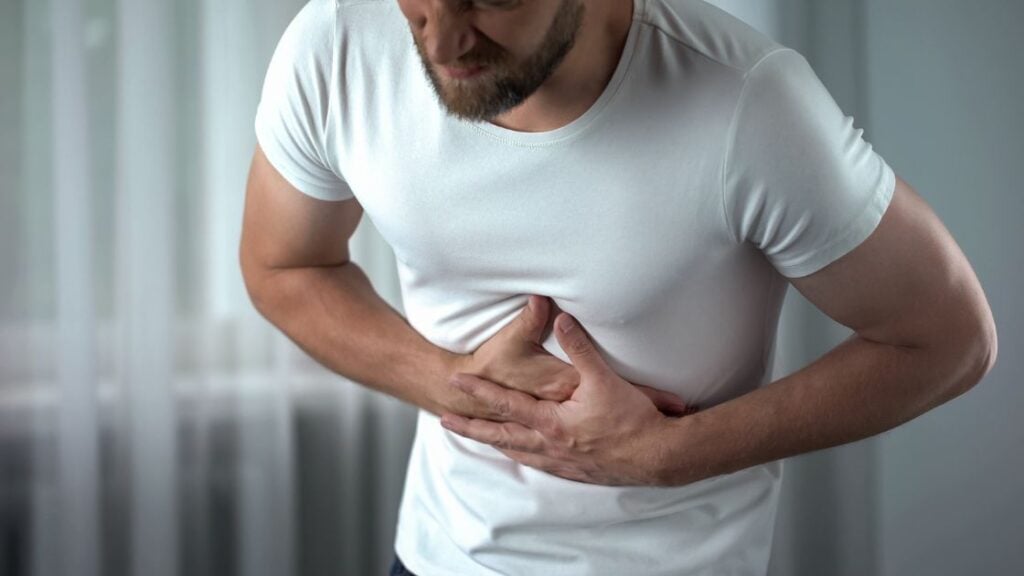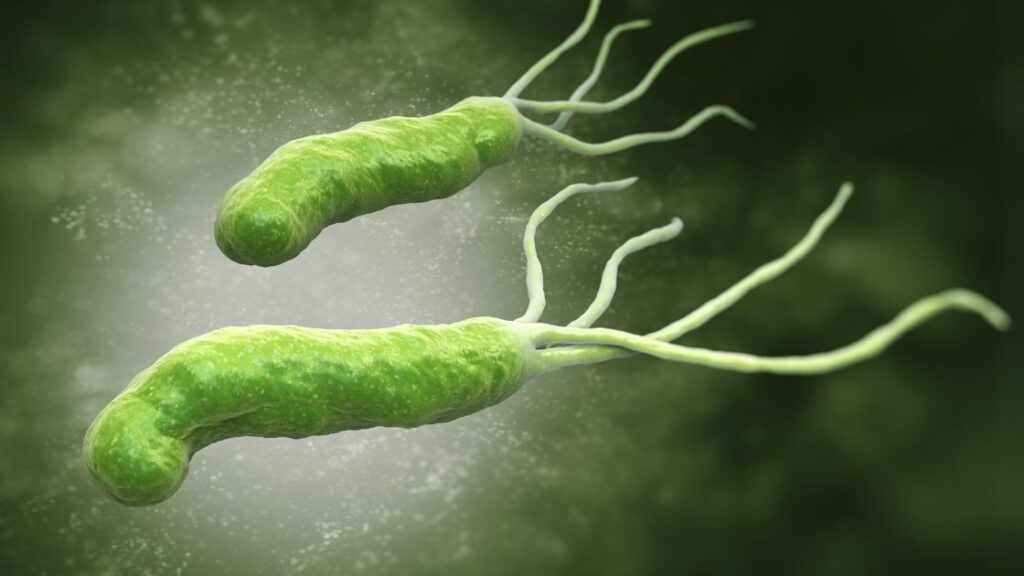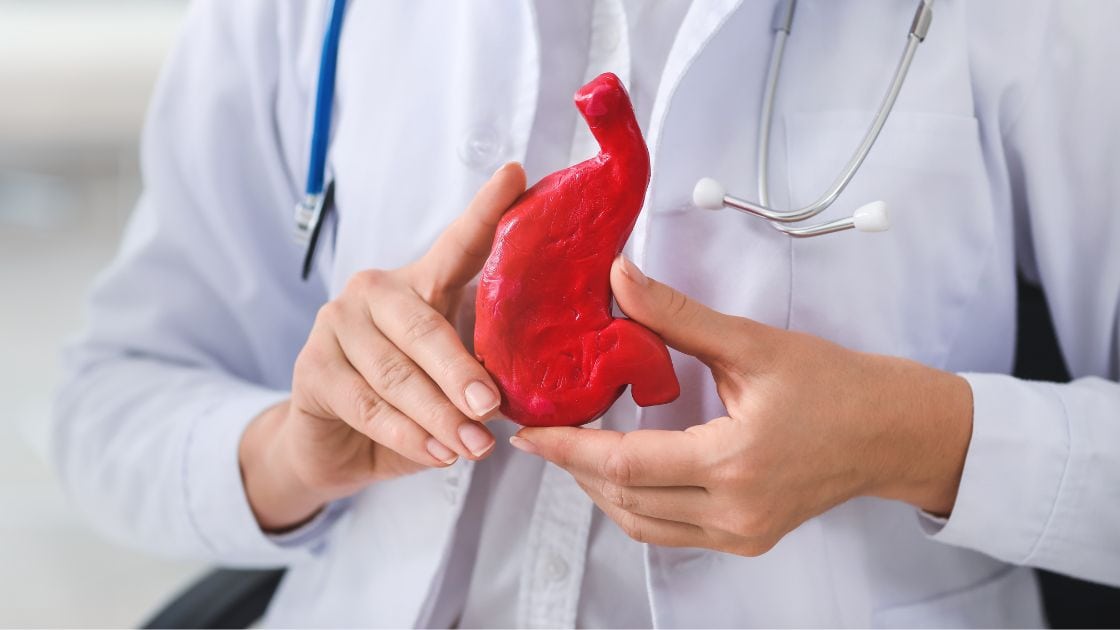In this blog, you will learn how to recognize peptic ulcers, what are its causes, and treatment.
Gastric ulcers are a nightmare. If you have ever suffered from this terrible ailment, you know what I’m talking about.
Having a peptic ulcer is living in a bad mood, not being able to enjoy food, and always carrying an upset stomach with you.
But you don’t have to live like this all the time. Do you want to know what are the causes of this ailment?
Of course, I know your answer. Keep reading and find out not only the causes but also its symptoms and treatment.
Symptoms of a peptic ulcer?

Constant stomach pain
One of the pains that tend to occur most frequently is a pain in the abdominal area.
The pain is usually located in the pit of the stomach. It arises two to three hours after meals. The discomfort usually disappears with the intake of food or the use of antacids.
When the ulcers are very large or there are many ulcers, the pain usually takes a long time to go away.
Other people with ulcers have reported constant pain. That is, it becomes persistent throughout the day and even at night.
Can you imagine living with constant pain day and night? Sounds awful. Well, likewise it is having a peptic ulcer, a terrible discomfort.
Nausea
Another very annoying symptom that people with peptic ulcers have is nausea.
That unpleasant feeling in the stomach makes the appetite disappear and it is more difficult to eat. However, feeding is vital in this disease.
Some medications can reduce nausea, however, it is best to attack the cause. That is, treat the ulcers so that the symptoms disappear.
Heartburn
Heartburn is the most frequent and most difficult symptom to bear. Most people have had heartburn at least once in their life and know how unpleasant it is.
Many times when we eat something spicy, we can suffer heartburn at night. But once the food leaves the body, we will not feel any more heartburn.
In the case of peptic ulcers, it is not so simple, heartburn is very frequent, especially at night.
Heartburn must be treated quickly to alleviate the frequency of appearance. When acid from food rises into the esophagus, it can inflame it, causing esophagitis. Esophagitis further worsens all the symptoms of gastritis.
What are the causes of peptic ulcers?
H. pylori

Have you heard of the Helicobacter pylori bacterium? Well, this bacterium is often the cause of gastritis and stomach ulcers.
Helicobacter pylori bacteria usually live in the mucosal layer that protects the tissues lining the stomach and small intestine.
Many times, this bacteria does not cause problems, but it can inflame the lining of the stomach and cause an ulcer.
It is unclear how the infection with Helicobacter pylori spreads. A person can spread the infection to another by close contact, such as kissing. People can infect with Helicobacter pylori through food and water contamination.
Regular intake of specific analgesics
Many pain relievers and non-steroidal anti-inflammatories can be purchased without a prescription. But this often brings problems.
Some people consume these medications without control and in excess, which can cause peptic ulcers.
For example, aspirin use can irritate or worsen the mucosal lining of the stomach and large intestine. Other harmful drugs are:
- Ketoprofen
- Sodium naproxen
- Ibuprofen
Tumors derived from Zollinger-Ellison syndrome
One or more tumors that develop in the pancreas and duodenum can cause the unusual condition known as Zollinger-Ellison syndrome. Despite having fewer cases, this disease has severe symptoms.
Gastrin, a hormone that stimulates the stomach to produce a lot of acids, is released in large amounts by these tumors. Too much acid in the digestive system causes the formation of peptic ulcers in the duodenum and upper intestine.
Other causes
Some foods and drinks can be the main cause of gastritis and peptic ulcers.
When it comes only to food, it may be easier to heal the ulcers. Drug treatment should be followed along with a special diet.
Foods that cause gastritis and peptic ulcers are:

- Very salted food
- Spicy
- Carbonated drinks
- Fast food.
- Citrus.
- Very burnt food
Alcohol and cigarettes can also cause stomach ulcers. Especially if they are consumed on an empty stomach.
If the cause of our ulcer is due to food, it means that Vicki Baum is right to say:
“You don’t get ulcers from what you eat. You get them from what’s eating you.â€
What is the treatment for peptic ulcers?
Depending on the cause, the treatment is selected. If the ulcer is due to H. pylori, treatment usually includes antibiotics to kill it.
If the cause is overuse of medications, the use of non-steroidal anti-inflammatory drugs (NSAIDs) should be minimized. If the cause is due to food or any other, medications should be administered to help heal the ulcer.
The medications consist of:
- Medications that prevent the creation of acid and aid in recovery.
- Antibiotics to kill Helicobacter pylori.
- Drugs that reduce acid formation.
- Antacids that neutralize stomach acid.
- Drugs that protect the lining of the stomach and small intestine.
Usually, the doctor can prescribe a combination of medications. Treatment should include the removal of the cause and management of symptoms.
“It was so frustrating to see ulcer patients having surgery, or even dying when I knew a simple antibiotic treatment could fix the problem.â€
Now that you know the treatment options, you know that it is easy to cure. But…
If I don’t treat an ulcer, what can happen?
This is where the complications come.
Are there possible complications of peptic ulcers?

Untreated peptic ulcers can cause:
Internal bleeding. Losing blood as a result of bleeding can lead to anemia. If this happens, a blood transfusion or hospitalization may be necessary. Black or bloody stools or bloody vomit are an alert for internal bleeding.
A perforation in the stomach wall. Ulcers can perforate the wall of the stomach or small intestine. This perforation can cause a dangerous infection of the abdomen called peritonitis.
Obstruction. Peptic ulcers can prevent food from passing through the digestive tract, leaving you feeling full quickly. This can lead to weight loss, vomiting, and swelling.
Gastric cancer. According to studies, people who have a Helicobacter pylori infection are more likely to get stomach cancer.
Avoid peptic ulcers
You already know the symptoms of peptic ulcers so be aware of any alarms. There are many treatment options but it is essential to find its cause. The best way to find out the cause is to see a doctor. Don’t endure pain, visit your doctor and avoid complications.

I am a professional health and nutrition writer with extensive experience in the industry. My passion for sharing valuable insights on nutrition and wellness stems from over 15 years of personal training and maintaining a healthy lifestyle. My commitment to continuously educate myself on the latest trends and research in the field allows me to deliver high-quality content that is informative and engaging. My mission is to empower individuals to make informed decisions about their health and well-being through my writing.






